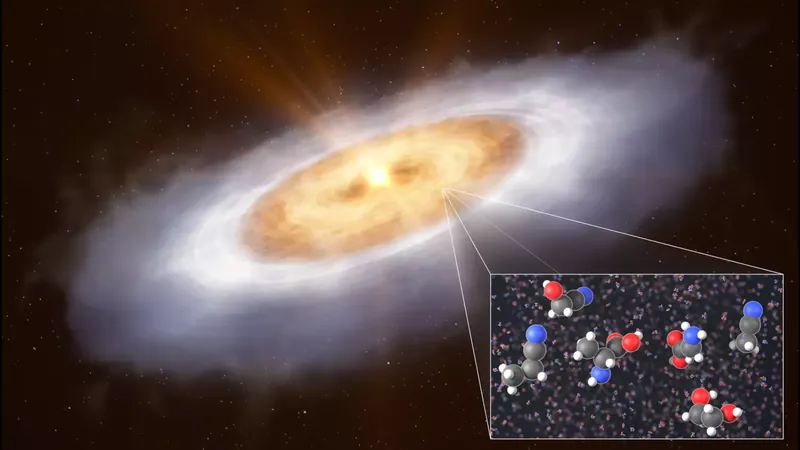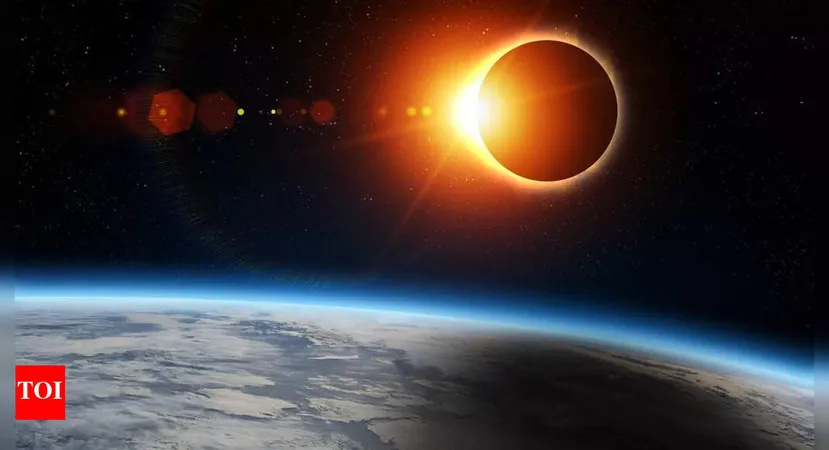
Are We Alone? Exciting New Discoveries Suggest Life's Building Blocks Are Everywhere in Space!
2025-07-31
Author: Mei
Astronomical Breakthrough: Signs of Life's Precursors Discovered!
In a groundbreaking discovery, astronomers have uncovered complex organic molecules—key ingredients for life—in a planet-forming disk surrounding a distant star. This discovery suggests that the essential chemical precursors of life may be formed in space and later spread to young, developing planets.
Utilizing the Atacama Large Millimeter/submillimeter Array (ALMA) based in Chile, the research team identified traces of 17 different complex organic molecules in the protoplanetary disk of V883 Orionis, a young star located about 1,305 light-years away in the Orion constellation. This star is a mere 500,000 years old—a baby in cosmic terms compared to our own middle-aged sun, which is about 4.6 billion years old.
What Are Complex Organic Molecules?
Complex organic molecules are defined as compounds consisting of over five atoms, at least one being carbon. These molecules have previously been observed in star and planet formation zones. However, the compounds discovered around V883 Orionis include pivotal compounds like ethylene glycol and glycolonitrile. These substances are recognized as precursors to vital amino acids and even the building blocks of DNA and RNA, specifically the nucleobase adenine.
A Missing Piece in Cosmic Chemistry?
This monumental find could bridge gaps in our understanding of molecular evolution around young stars, explaining the transition between star formation and the onset of planet development in surrounding disks. Abubakar Fadul, the lead scientist from the Max Planck Institute for Astronomy, noted, "Our finding indicates a direct path of chemical enrichment and complexity from interstellar clouds to fully developed planetary systems."
The Cosmic Assembly Line: How Stars Are Born
Stars are born from dense clumps in vast clouds of interstellar gas and dust, collapsing under gravity to form protostars. These celestial bodies continue to gather material until the conditions are right for nuclear fusion, marking the rise of a main-sequence star. Surrounding the protostar is a swirling disk of gas and dust, known as a protoplanetary disk, which is where planets will eventually form.
Rethinking Planetary Chemistry: A Radical New Perspective
Traditionally, it was believed that complex biological molecules could only form during later stages of a protoplanetary disk’s evolution. However, this new evidence indicates that protoplanetary disks may inherit complex molecules left over from earlier stellar stages, contradicting the "reset scenario" that suggested a latter formation.
Kamber Schwarz, an MPIA researcher, emphasized, "Our findings propose that the molecules essential for life can originate earlier than previously thought and can continue to form within protoplanetary disks." This implies that the conditions necessary for life may be far more ubiquitous across the universe than we ever imagined.
The Icy Secrets of the Cosmos
Because the processes that generate these complex molecules thrive in colder environments, they might be concealed within the icy dust and rock of young planetary systems. These molecules could be released into the cosmos as materials are heated by the star at the center of these disks, revealing their presence in dramatic cosmic displays akin to the vibrant tails of comets in our own solar system.
What Lies Ahead for Astronomers?
While V883 Orionis has yet to reach the necessary mass for nuclear fusion, it is undergoing processes that heat the surrounding disk, allowing for the release of the detected chemicals. Fadul concluded, "This discovery heightens anticipation for future explorations, as there could be even more complex molecules waiting to be uncovered. Our mission now is to study the light from stars like V883 Orionis across different wavelengths to find even more evolved compounds."
With so many tantalizing possibilities at our doorstep, who knows what other secrets the universe might reveal?



 Brasil (PT)
Brasil (PT)
 Canada (EN)
Canada (EN)
 Chile (ES)
Chile (ES)
 Česko (CS)
Česko (CS)
 대한민국 (KO)
대한민국 (KO)
 España (ES)
España (ES)
 France (FR)
France (FR)
 Hong Kong (EN)
Hong Kong (EN)
 Italia (IT)
Italia (IT)
 日本 (JA)
日本 (JA)
 Magyarország (HU)
Magyarország (HU)
 Norge (NO)
Norge (NO)
 Polska (PL)
Polska (PL)
 Schweiz (DE)
Schweiz (DE)
 Singapore (EN)
Singapore (EN)
 Sverige (SV)
Sverige (SV)
 Suomi (FI)
Suomi (FI)
 Türkiye (TR)
Türkiye (TR)
 الإمارات العربية المتحدة (AR)
الإمارات العربية المتحدة (AR)